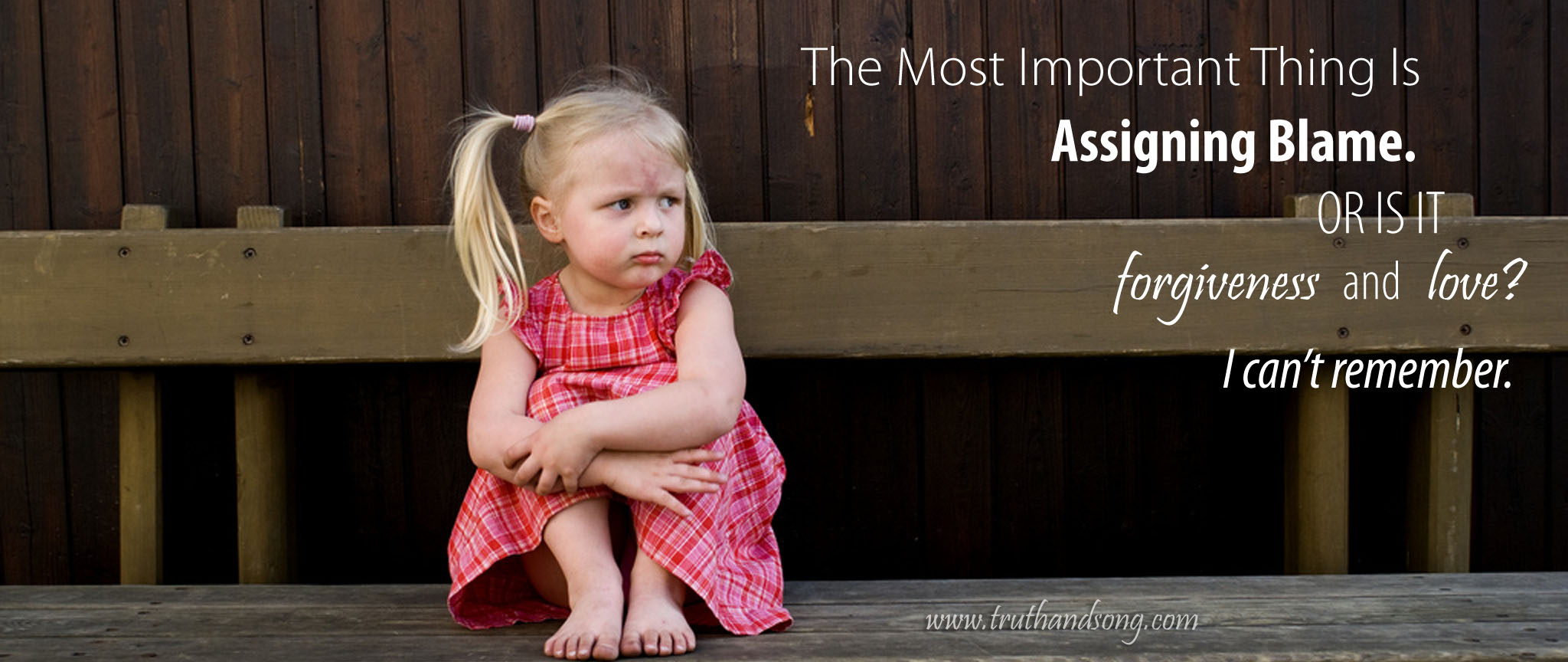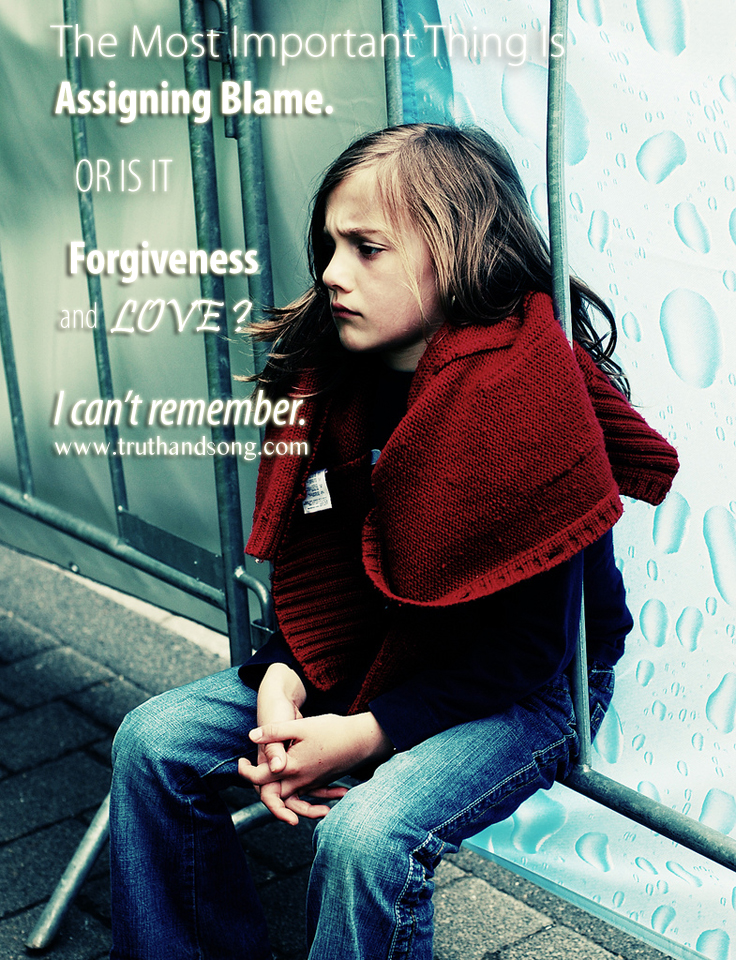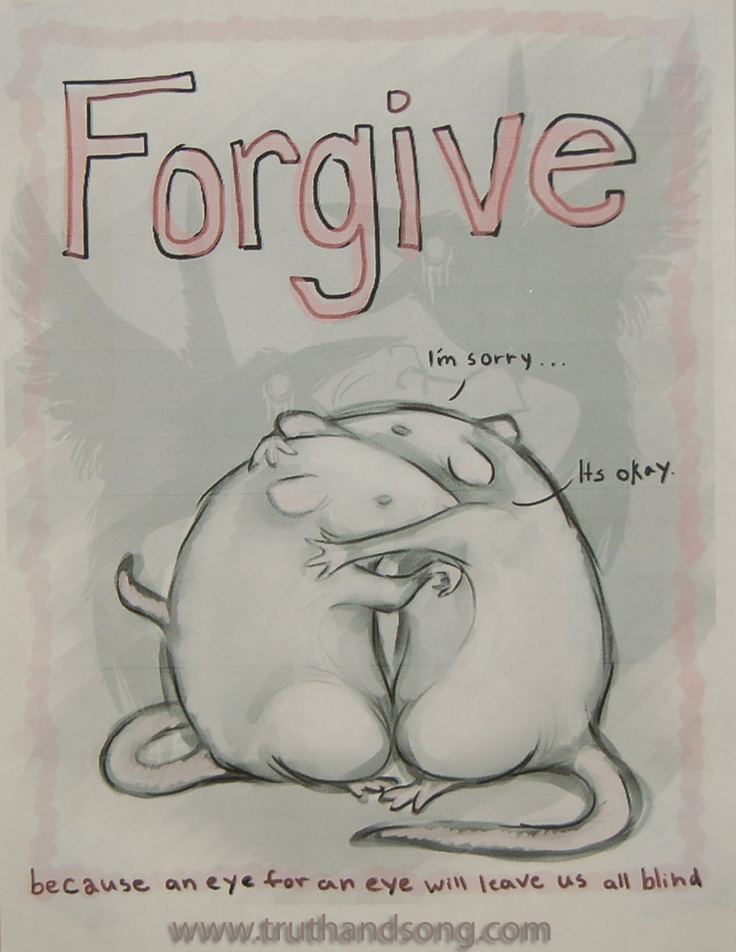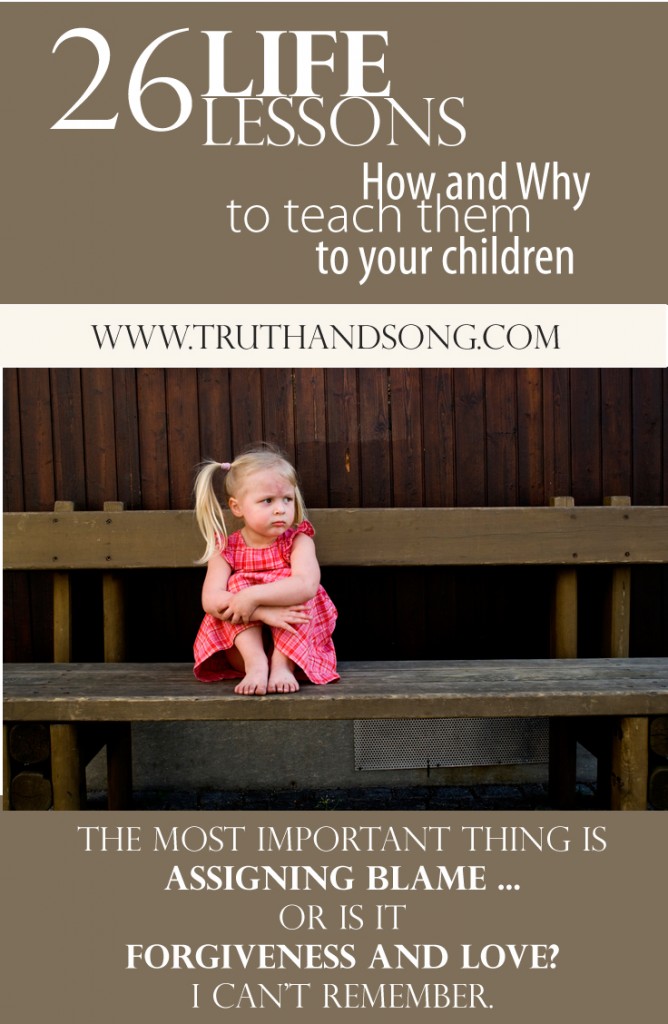Actually, the most important thing is forgiving and loving the offender …
but that’s not as catchy.
When someone has hurt you, especially repeatedly, it is difficult enough to forgive, but to love is a whole other mountain. Maybe, you played a small or big part in the wrong doing. Maybe you did nothing wrong. Either way you may start acting as if “The Most Important Thing Is Assigning Blame“ rather than following a biblical pattern for living.
When trying to forgive, you might start asking these questions.
- How can you forgive and love someone who has hurt you?
- How can you do something that is completely opposite of what you feel?
- Should you learn and teach your children something with which you still struggle? Isn’t that being a hypocrite?
Should you learn and teach your children, even though you struggle with it?
I’ll answer that question first. Yes. Learn and teach and talk to your children about how you may be inconsistent (not hypocritical) because you are learning as well. It will reinforce the lessons within yourself as you teach them to your children.
If we do not learn and teach this lesson, then we have adults in continual cycles of:
- fighting
- sulking
- being bitter
- chained to mental accusations and arguments
- prideful and unapologetic for our own faults
- unwilling to agree to disagree
- unable to move past things
- defeated in the battle of esteeming others better than ourselves
How can you do something that is completely opposite of what you feel?
1. I know this sounds brutal, but the first step is to realize that you have no option. It’s a command.
As adults we have to do this all the time. We may work in uncomfortable situations, but we know we have to go to work. When you need a sick day but you get up anyway because the job “won’t get done by itself.” When you smile at the rude customer because it is part of your job.
The same is true about God’s commands. It is part of your “acceptable” and “reasonable service.” (Romans 12:1)
2. Commit your works unto the Lord, and your thoughts will be established.
Just do it. (Proverbs 16:3)
One of my favorite biographies is Evidence Not Seen, by Darlene Deibler Rose. The thing that sticks out to me the most whenever I read it is the impact that true forgiveness and love can have on the cruelest of people.
Here is an excerpt where after she finds out about her husbands death in the men’s POW camp, she is called in to see Mr. Yamaji. He was known to beat, disfigure and murder with blood lust in his eyes.
“Mr. Yamaji, may I have permission to talk to you?” He nodded, sat down, then motioned for me to take the other chair.
“Mr. Yamaji, i don’t sorrow like people who have no hope. I want to tell you about Someone of Whom you may never have heard. I learned about Him when I was a little girl in Sunday School back in Boone, Iowa, in America. his name is Jesus. he’s the Son of Almighty God, the Creator of heaven and earth.” God opened the most wonderful opportunity to lay the plan of salvation before the Japanese camp commander. Tears started to course down his cheeks. “He died for you, Mr. Yamaji, and He puts love in our hearts – even for those who are our enemies. That’s why I don’t hate you, Mr. Yamaji. Maybe God brought me to this place and this time to tell you He loves you.”
With tears running down his cheeks he rose hastily and went into his bedroom, closing the door. I could hear him blowing his nose and knew he was still crying. We weren’t supposed to leave the presence of Japanese officer without permission; however, since he didn’t return to dismiss me, I sat quietly praying for his salvation, that he might understand new life in Christ Jesus and someday go home to share God’s love with his wife and family –
Years later Darlene heard that Mr. Yamiji had spoken on radio, sharing the Gospel of Jesus Christ with the Japanese people. Darlene felt this to be one of the greatest rewards of God’s work in her life.
How can you forgive and love someone who has hurt you?
1. The key to forgiveness is training your mind.
You will hear me talk about this often throughout the 26 Life Lessons Series.
When you recognize that it would be disobedient to God to not forgive (Matt. 6:14-15, Matt. 18:21-22, Eph 4:32, Col 3:13), then the next step is:
2. Recognizing what forgiveness is.
I define forgiveness as “Not bringing it up again.” This includes both in your mind, or out your mouth. We are better at not bringing it up things in conversation, but aren’t so good at keeping the painful situation from replaying in our minds.
You hear people say, “I can forgive, but you can’t expect me to forget.” Well, that may be helpful as far as setting boundaries is concerned, but it is not true in relation to sincere forgiveness.
3. We have to choose to voluntarily “forget” the misdeed.
You need to develop an emergency stop technique for when these thoughts arise.
- The STOP button – On a treadmill there is an emergency “STOP” button. If something goes wrong or you have to leave right away, you just hit the “STOP” button and it stops. When an unwanted thought arrives in your mind, you picture yourself hitting the big red button and then think of something praiseworthy.
- *Blinking* – When you consciously blink and focus on the physical action. It helps your mind to momentarily go black. Then I redirect my thoughts to good things.
- A Thought Prison (2 Cor 10:5) – When a thought keeps resurrecting itself, I pray and ask God to put it into captivity and lock it up so that it will not re-appear. I imagine Jesus talking the thought and putting it behind bars. Then I choose to think of something positive.
It may be necessary to follow your technique every moment throughout the day when you are struggling, but it is possible and necessary to gain control of your thought life with the help of God. (2 Tim 1:7)
4. Love the unlovely. The final step. You will not be successful against blame and bitterness without this step.
It is pretty clear from the Bible that God wants us to love our enemies. I know that not everyone that hurts us is our enemy, but if God wants us to be charitable to enemies, than wouldn’t it be even more true for our family and sisters and brothers in Christ.
It can be pretty hard to pray for someone and seek good will for them. Yet, it aids in forgiveness and keeping out even the root of bitterness.
Can you say, “I love (those who hurt me)?” If not, then you need to ask God to help you in that.
Here are some things we need to do in regards to our “offenders.”
- We need to be careful about malice: wanting bad to come to them. (Prov 24:17, Matt 5:7)
- Don’t seek vengeance. It’s not our place. An eye for an eye is not for the New Testament Christian. (Rom 12:19, Heb 10:30, 1 John 3:14)
- Don’t let pride get in the way of peace. (James 3:14-18, Gal 5:22, Eph 4:2-3)
- We need to help them when they are in need. (Prov 25:21-22, Rom 12:20, Luke 6:27)
- We need to pray for them. (Matt 5:44, Luke 6:28)
- Don’t take it so personally. This one is hard for me as a people pleaser. It happens to the best of us. (Gal 4:16)
Now, how do you teach it to your children?
I don’t think that my way is the best way or the only way to accomoplish this, but here are some ideas to help stimulate your creativity.
Knowledge of the Basics: Elementary Age and Younger
At this age, children don’t have a lot of complexity or understanding in their behavior. They are just being taught from you what is right and what is wrong. They are being taught how to act in each situation, but don’t understand the “why’s” behind it. So when a child is hurt or hurts someone else take that as your opportunity to teach them the very basics.
Look the other child in the eye and with a good attitude say, “I’m sorry.”
or
Look the other child in the eye and with a good attitude say, “I forgive you.”
Then make sure there are no bad attitudes or nasty words as they resume playing or their separate activities.
Understanding: Middle School
At this age, understanding and logic begins to develop. Kids want to know why things happen and why they feel certain ways. Yet, they don’t always have the vocabulary skills to communicate well. When an offense happens, this is your opportunity to help them understand what is going on.
My oldest daughter is a melancholy / sanguine temperament. That means she feels deeply and she has a flair for the dramatic. The melancholy personality is very prone to long-term hurt feelings and bitterness. So, I have taken extra care throughout her life to teach her to work on her communications and thought life.
When she is hurt, she has a tendency to sulk. Instead of being angry or saying things like “Suck it up. Life isn’t fair.” I ask her why she’s upset. I ask her what she is feeling. If she doesn’t know what she is feeling, I try to remember my own similar experiences and how I felt and describe to her what I was feeling in them. That way when she relates, she then has the vocabulary to describe it next time. I don’t degrade her feelings. I help her to understand them.
I love this article at Family Life that shows how feelings are like horses. Every mom should read this. I honestly cannot give a better description on teaching your child to tame their emotions than this.
After you open that link in another tab for later, let’s move on to the next step.
Wisdom in Heart & Actions: Jr. High and Older
1. Don’t listen to your heart. *gasp* You need to listen to your head … or more precisely, what the Bible says. (Jer 17:9, Prov 18:2)
This is immensely difficult for females, but both genders need to heed this advice. Your feelings must not control you. You must control your feelings and spirit. (Prov 14:29, Prov 16:32, Prov 25:28)
2. Talk to them about what forgiveness is.
Pray with them. Go back to the lessons you taught them about “Happiness Being a Choice” and relate to them that forgiveness is much the same.
3. Reaching out. Where the rubber meets the road.
I spoke to several moms recently about bullying.
Bullying can be verbal or physical. It can come at the hands of a political regime. It can come at the hands of peers. It can come from siblings. It can be the greatest opportunity you ever have to teach your child to love their enemies.
One mom described a plight she had where her child would come home from church bleeding, weekly. She said that they tried every biblical approach.
Inviting the kids over for activities.
Visiting together with families.
Baked goods.
The list can go on and on.
She said that none of them were “successful.” But that is only true if success is defined by getting someone else to change. But they were immensely successful in teaching their child to love and forgive and to wait upon the Lord.
In a nutshell:
- Use real life circumstances.
- Show your child that the Bible has everything they need to help them in every situation.
- Have them memorize the Scripture verses that pertain to forgiveness and love.
- In a positive way (not “preaching to them”), help them use those verses as a lamp to guide their paths from youth through adulthood. (Psalm 119:105, Psalm 119:111)
This was a longer Life Lesson, but one of the most important. Let’s recap what was gone over.
-
Assigning Blame is not the most important thing.
-
Forgiveness and Love is the most important thing.
-
You can and should learn and teach this to your child, even if you struggle with it.
-
You can do something that is completely opposite of what you feel.
-
You can forgive and love someone who has hurt you.
-
How to teach this to your children.
Did you miss the other Life Lessons in this series?
Check them out and share them with your friends.
Find them here: 26 Life Lessons





Leave A Comment
You must be logged in to post a comment.